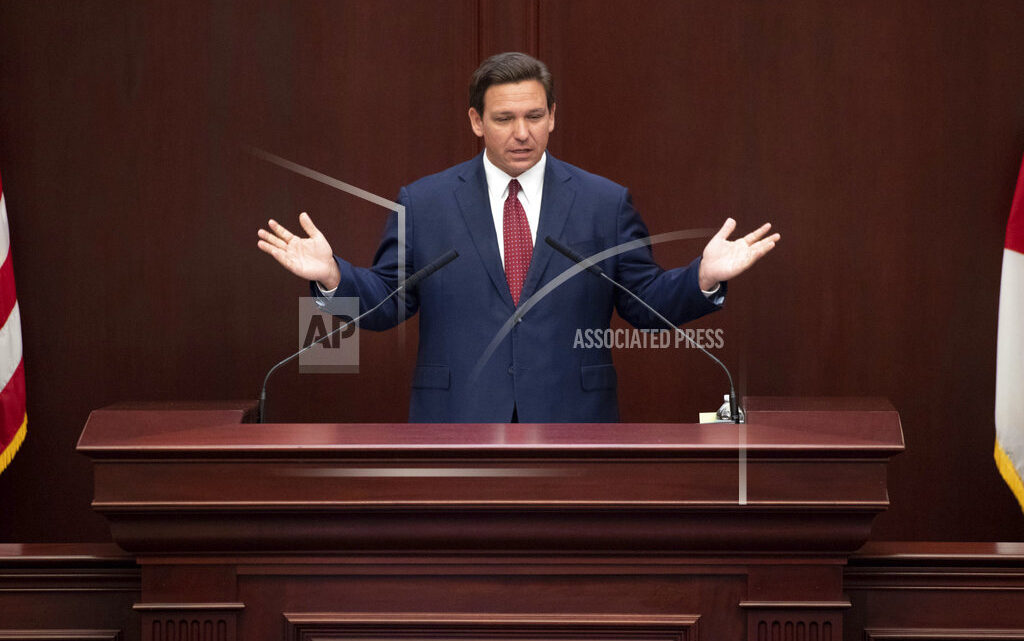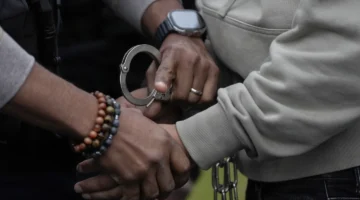Florida Gov. Ron DeSantis gives his State of the State speech in the House of Representatives chamber on the first day of the 2021 Legislative Session in Tallahassee, Fla. Tuesday, March 2, 2021. (Tori Lynn Schneider/Tallahassee Democrat via AP)
DeSantis plans to send COVID relief money to 1st responders
TALLAHASSEE, Fla. (AP) — Florida Gov. Ron DeSantis announced plans Tuesday to shore up his state’s emergency management system, as well as give $1,000 bonus checks to the state’s cadre of first responders under a spending proposal to disburse some $10 billion Florida is expected to reap under the latest federal COVID-19 relief bill.
During a Capitol press conference, DeSantis announced a laundry list of spending priorities totaling about $4.1 billion — a big slice of the roughly $10 billion Florida is expected to get from the stimulus package President Joe Biden signed last week.
State lawmakers will get to decide whether to implement the governor’s recommendations as part of the budget they must approve before they adjourn in late April. With the additional spending, the governor is now asking lawmakers to consider funding nearly $100 billion in programs — up from the $96.6 billion budget he unveiled in January.
Even as he listed his spending priorities, DeSantis bemoaned how the Biden administration would be distributing $1.9 trillion in relief money to states and local governments in the coming weeks and months. The federal government is distributing money not by population but based on the number of unemployed residents — a method that DeSantis contends penalizes states like his whose economies are recovering more quickly than other big states.
“We’re getting the short end of the stick — make no mistake about it,” DeSantis said. “But we’ll make the best of what we have, and I think we’ll be able to get a lot done for the people of Florida.”
The governor said he wants to use $1 billion to establish an Emergency Management Response Fund. The state’s emergency management system, more accustomed to handling hurricanes and other emergencies, has been in the forefront in responding to the coronavirus outbreak, which plunged the state into a public health crisis about a year ago.
Another $1 billion would go toward the state’s resiliency campaign against rising sea levels.
The Republican governor’s plan also includes nearly $260 million to help seaports, which were hit hard by the coronavirus pandemic that crippled the cruise industry and hampered shipping traffic. And he would use about $73 billion of that money to help modernize the state’s CONNECT system, the much-maligned platform Floridians use to get unemployment benefits.
More than $208 million of the money would go directly to first responders in the form of one-time direct payments.
“We know the pandemic put a lot of strain on our first responders — EMTs, sworn law enforcement, firefighters — so we believe we should recognize their sacrifice,” the governor said.
As is often the case, the governor does not always get exactly what he wants — and lawmakers will no doubt be scrutinizing the additional budget outlays in the weeks to come.
House Speaker Chris Sprowls said through a spokeswoman that he looks forward to working with DeSantis and Senate President Wilton Simpson on delivering a balanced budget.
“The speaker has expressed a strong desire to act on many of the items the Governor outlined in the letter sent today, including creating an emergency preparedness fund to ensure that Florida is always ready and investments in flooding resilience and our workforce,” said the spokeswoman, Jenna Sarkissian.
DeSantis, criticized by some in his own party about how he has budgeted the use of previous pandemic money, said he would let the state Legislature decide how to spend the remaining $6 billion of the federal relief money. He suggested that some of that money could be put in reserves.
Florida could receive about $17 billion as part the federal pandemic relief package, with $7 billion going to cities and other local governments.
A key Democrat welcomed some elements in it — like direct payments to first responders.
“It sounds like some of these are very worthy, but I’d like to see more detail,” said Rep. Evan Jenne, the Democratic co-leader in the Florida House.
“There’s still a long budgetary process for all of this to go through, and ultimately it will have to pass through a whole bunch of legislative hands,” Jenne said.




No Comment